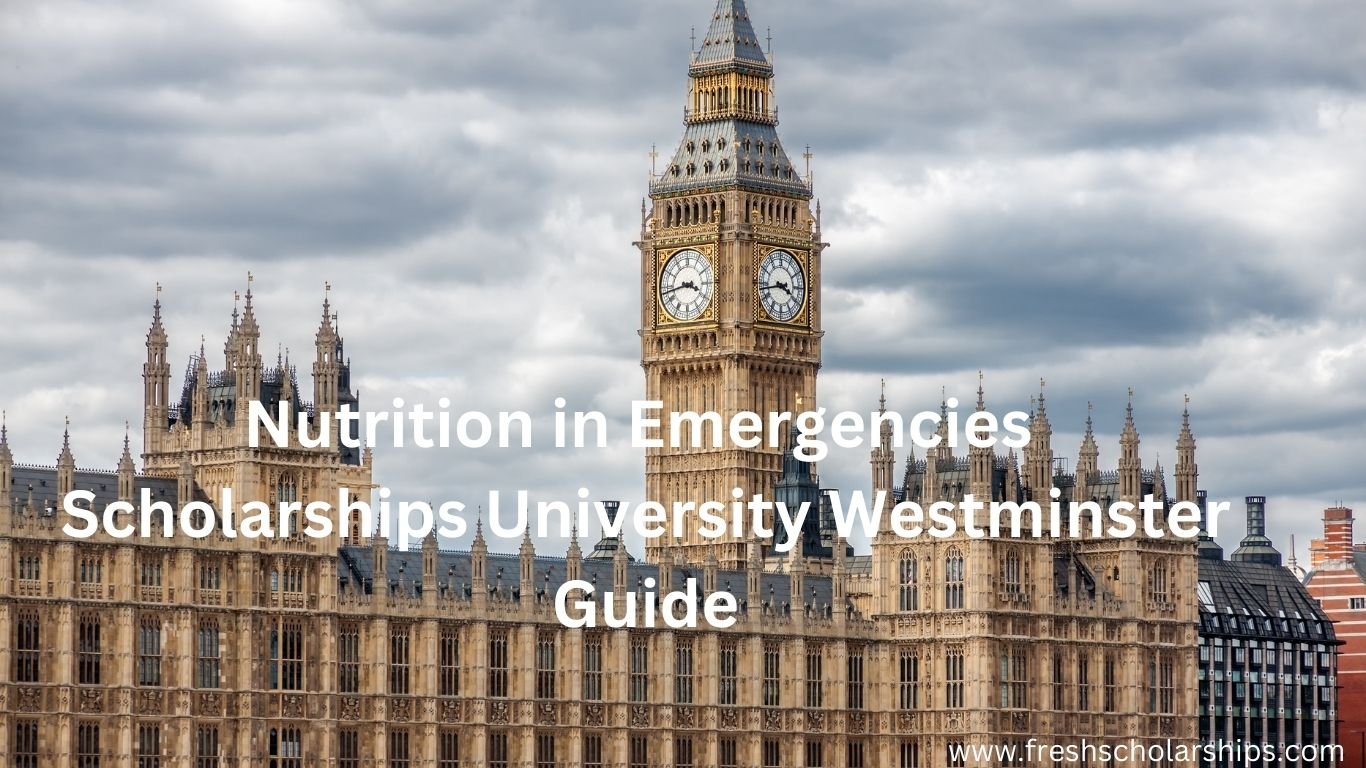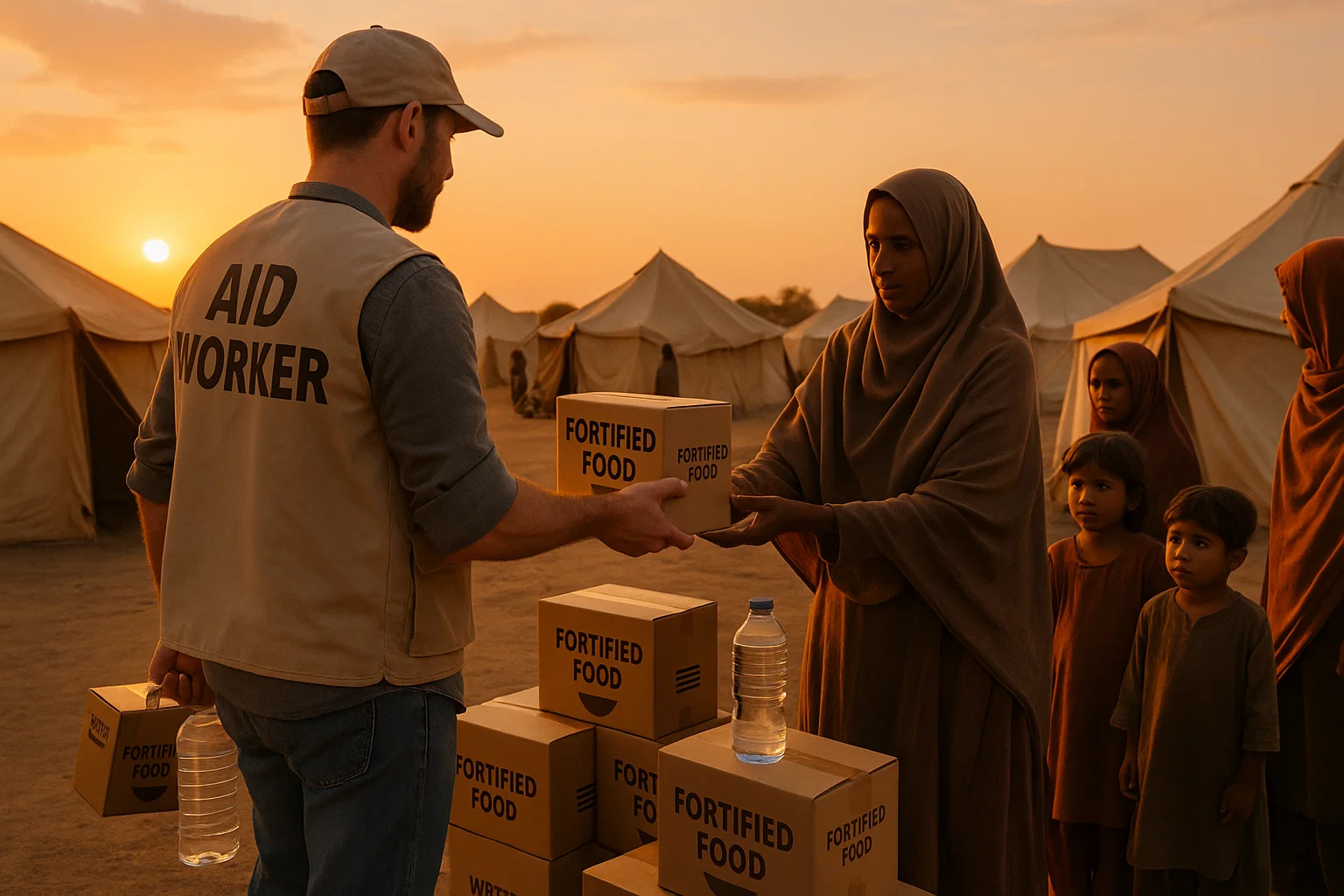
When Food Becomes a Lifeline: Why Nutrition in Emergencies Matters
Imagine waking up in a place where food isn’t just a meal it’s survival. In refugee camps, war zones, and disaster-stricken regions, a single bowl of fortified porridge can mean the difference between life and death. That’s the world of nutrition in emergencies a field where science meets humanity.
Malnutrition doesn’t wait for peace. When disasters strike, children are often the first to suffer. According to UNICEF, over 45 million children under five are wasted worldwide, and emergencies make that number soar. In these moments, trained professionals become the backbone of survival efforts.
That’s exactly where the University of Westminster’s Nutrition in Emergencies Scholarships step in offering education that turns compassion into expertise.
Understanding the Urgency: What Defines a Nutritional Emergency
A nutritional emergency happens when food insecurity, poor sanitation, or disease outbreaks push communities into severe malnutrition. Think of famine in Sudan, floods in Pakistan, or prolonged drought in the Horn of Africa. These events destroy crops, disrupt food supply, and overwhelm fragile health systems.
There are several triggers for nutrition emergencies:
- Conflict and displacement: Families lose access to farms and markets.
- Natural disasters: Floods, droughts, and earthquakes cut food supply chains.
- Economic collapse: Prices soar, making food unaffordable for millions.
- Health crises: Epidemics like cholera worsen malnutrition rates.
During such times, the major nutritional deficiency diseases appear fast vitamin A deficiency leads to night blindness, lack of iodine causes goiter, and insufficient iron causes anemia. These aren’t just numbers; they’re preventable tragedies.
And this is why trained nutritionists are urgently needed to lead rapid assessments, design feeding programs, and coordinate aid with agencies like WHO and WFP.
How the University of Westminster Steps In
The University of Westminster, based in the heart of London, has become a global name in humanitarian education. Its Nutrition in Emergencies Scholarships are designed for those who want to make a tangible impact in the world’s toughest environments.
The scholarship supports students in the MSc in Nutrition and Public Health program offering specialized training on emergency response, malnutrition prevention, and sustainable food policies. Westminster’s curriculum blends field knowledge with real-world application, ensuring that graduates are ready to work in both crisis zones and policy settings.
This initiative aligns with the United Nations Sustainable Development Goals (SDGs), particularly SDG 2 (Zero Hunger) and SDG 3 (Good Health and Well-being). The aim? To create leaders who can build stronger, healthier communities even in disaster-hit regions.
What the Scholarship Covers and Who It’s For
The Nutrition in Emergencies Scholarship at Westminster is more than financial support it’s an opportunity to grow into a humanitarian leader.
Coverage includes:
- Full tuition fee waiver for the MSc in Nutrition and Public Health
- Living allowance (depending on available funding)
- Mentorship and networking opportunities with global health professionals
Eligibility usually includes:
- Applicants from developing countries, particularly in Africa, Asia, and the Middle East
- A strong academic background in nutrition, public health, or related sciences
- Demonstrated commitment to humanitarian or community work
- Proof of English language proficiency (IELTS or equivalent)
This scholarship is perfect for professionals already working in NGOs, government health departments, or local relief agencies who wish to deepen their impact through advanced education.

Application Process Made Simple
Applying for this scholarship doesn’t have to feel overwhelming. The University of Westminster makes it accessible if you plan smartly.
Here’s how to approach it:
- Start early. Review the university website for the latest application deadline. It usually opens in late fall and closes around May.
- Choose your course. Select MSc Nutrition and Public Health and specify your interest in emergency response.
- Gather your documents. (See checklist below.)
- Write a personal statement. Focus on your experiences with malnutrition, relief projects, or health outreach. Explain how the program connects to your goals.
- Apply online. Use Westminster’s application portal.
- Submit your scholarship form. Usually done after submitting your course application.
- Wait for results. Successful candidates are notified by email.
Reality Check: Deadlines come faster than expected. Many great candidates miss out simply because they start too late. Begin preparing your documents months ahead.
Required Documents Checklist
To make it easier, here’s what you’ll need:
| Document | Description |
|---|---|
| Academic transcripts | From your undergraduate degree |
| Degree certificate | Proof of completed qualification |
| Personal statement | Explains your motivation and future goals |
| CV or resume | Highlight relevant field experience |
| Two reference letters | Preferably one academic and one professional |
| English test score | IELTS, TOEFL, or equivalent |
| Passport copy | For international applicants |
Quick Tip – Keep digital copies ready in both PDF and Word format. It makes editing and uploading easier.
Studying at Westminster: Where Learning Meets Global Action
Studying at the University of Westminster isn’t just about books it’s about belonging to a community that believes in making change. The campus itself is a vibrant mix of cultures, with students from over 160 countries.
The MSc program includes modules like:
- Nutrition Assessment in Emergencies
- Food Policy and Sustainable Diets
- Epidemiology and Global Health
- Public Health Interventions
Students also get to engage with organizations like UNICEF, Save the Children, and Médecins Sans Frontières, who often collaborate with the program on research or field placements.
Imagine learning how to design a feeding intervention for drought-hit communities or assess malnutrition data from real humanitarian operations. That’s the kind of practical experience that sets Westminster graduates apart.
Beyond the Classroom: Career Paths After Graduation
Graduates of this program go on to lead in some of the world’s most impactful organizations. With the scholarship’s strong global focus, alumni often work in:
- United Nations World Food Programme (WFP)
- World Health Organization (WHO)
- UNICEF
- Red Cross and Red Crescent Societies
- International NGOs and local community projects
Common job titles include:
- Emergency Nutrition Officer
- Humanitarian Program Manager
- Food Security Coordinator
- Research Analyst for Nutrition Policy
- Health and Nutrition Advisor
This scholarship doesn’t just open academic doors it opens doors to careers that save lives.
Quick Tips for a Strong Application
If you’re dreaming of this scholarship, keep these friendly reminders close:
Be real. Talk about what you’ve done, not just what you want to do. Real experience, even small, shows commitment.
Show your impact. Did you lead a nutrition drive or volunteer at a health camp? Mention it.
Connect your story. Explain why Westminster is the right fit for your goals.
Proofread twice. A single typo in a scholarship essay can weaken your first impression.
Ask for references early. Give your referees at least two weeks to prepare.
Reality Check: Many applicants have good grades but the ones who win scholarships show heart and purpose.
Why Scholarships Like These Matter for Global Health
At its core, this scholarship isn’t just about degrees it’s about dignity. Every trained nutritionist means fewer children go hungry, fewer families lose hope, and more communities recover faster after disaster.
Nutrition in emergencies is one of those rare fields that blends science, compassion, and courage. The University of Westminster understands that, and that’s why it invests in students who are ready to stand where others can’t.
So, if you’re reading this and feel that pull to do something bigger to turn empathy into action this might just be your moment.
Because every life saved starts with someone who cared enough to learn how.

Scholarship and education policy analyst sharing updates on global study grants, government programs, and policy changes across Asia, Africa, and the Middle East.